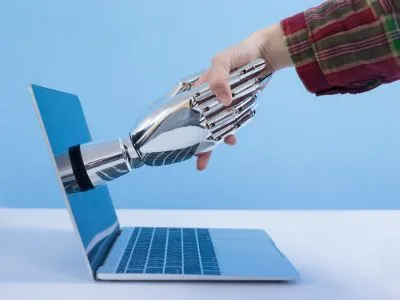At the heart of today's technological revolution, artificial intelligence (AI) associated with audio is booming. It is beginning to revolutionize the audio industry as we know it.
According to Ekoo's white paper on the new uses of audio in digital marketing, the world's giants have already been investing in this field for several years. The United States with $249 billion and China with $95 billion.
The numbers don't lie: the statistics testify to the massive impact of this powerful combination. According to a recent study by Market Research Future, the global market for AI in audio is expected to grow by 45% annually by 2027, reaching a value of $8.5 billion. These impressive figures indicate a massive adoption of AI in audio.

Artificial Intelligence for audio design
The integration of artificial intelligence into audio content creation represents an undeniable strategic advantage. It does marketers and content creators a world of good. AI enables the production of personalized audio content, adapted to the specific desires and listening behaviors of each audience.
This is the case of LOVO.ai, a text-to-speech platform that uses AI to create natural voices from text. This technology enables companies to generate and personalize their audio ads without using human voices. The text-to-speech technology is highly developed for English. It offers a wide range of nuances and intonations that closely resemble the natural human voice. However, for other languages, voice options may be more restricted and potentially less nuanced. This can result in slightly robotic, less authentic renderings.

AI simplifies audio editing
Moving from the creation to the fine-tuning of our content, AI is also a key tool in the post-production phase. It enables a smooth transition to innovative editing solutions. It is now possible toautomate audio mastering, eliminating many complex and tedious steps.
A perfect example of this shift is Auphonic, a platform that applies AI toautomate audio editing and equalization, as well as to optimize volume levels. Auphonic analyzes audio files and applies the necessary corrections to achieve optimal sound quality with little or no manual intervention.
Users simply upload their raw recording, and Auphonic takes care of the rest: noise cleanup, level normalization, and even metadata integration. Thanks to AI, content creators can concentrate on their creativity and their message, while thetechnical side is handled efficiently and automatically by the solution.

AI in the reproduction of famous voices
One of the most fascinating advances of AI in audio is its ability to imitate famous voices and make them sing. This opens up infinite possibilities, from tributes to innovative covers.
OpenAI has developed Jukebox, a model that can generate music with lyrics in the style of various artists, essentially by "singing" new songs that appear to come from these famous singers. Jukebox uses deep neural networks to analyze large musical datasets and mimic specific artistic styles. The system can take well-known melodies and have them interpreted by an AI that reproduces the voice of singers past or present.

However, the AI that is currently creating themost realistic auditory experience is DiffSVC. This artificial intelligence is based on a model that can modify a recorded voice to make it sound like that of another person, while preserving theoriginalemotion andintonation of the speech. It's a tool that's proving useful in a variety of contexts, such as dubbing films, personalizing virtual assistants or creating audio content for social media. However, access to DiffSVC for the general public has been limited due to a still unclear legal framework surrounding its use.
Artificial Intelligence translates and reproduces voices identically
The AI is now capable not only of translating speech into different languages, but also of rendering the translation with the tone, rhythm and intonation of the original voice. DeepDub is the most conclusive tool on the market.
The startup offers a dubbing solution where AI learns the timbre and style of an actor's original voice and can then apply these characteristics to translation into another language. This could revolutionize the dubbing industry. Firstly, by reducing time and costs, while opening up new opportunities for global distribution of audiovisual content. It would also preserve the essence of the original performances.
Artificial Intelligence is redefining the audio industry! It offers innovations that facilitate both the design of text and voice, and theediting of audio content. Thanks to cutting-edge tools, AI enables creators to concentrate on the artistic aspect, while delegating technical and time-consuming tasks to intelligent machines.
As AI continues to improve, we can expect ever more immersive sound quality and ever more agile editing processes.








